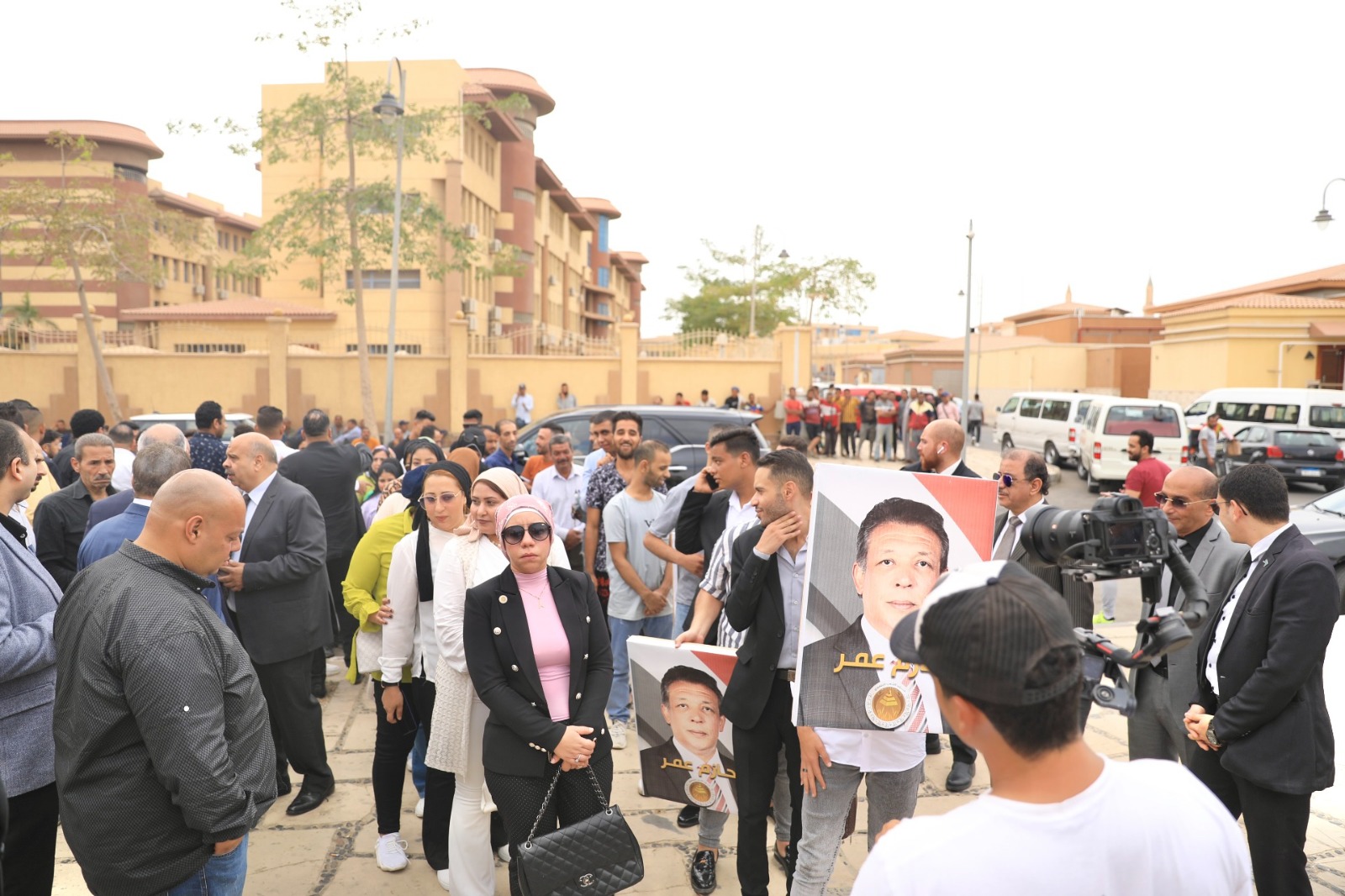Supporters of the Tantawi campaign are chanting in front of the Ministry of Justice headquarters in Cairo after being prevented from issuing official authorizations to support Tantawi’s candidacy
Over the past two days, international reactions have escalated in anger towards the Egyptian electoral scene, which, according to participants in the first round of the electoral process, suffers from a state of severe restriction and oppression. Reactions to the scene varied, starting from the recent session of the European Parliament, which seriously discussed the violations faced by potential presidential candidate Ahmed Tantawi and his campaign supporters, and the ways in which they were prevented from obtaining popular endorsements, aiding them in surpassing the candidacy threshold by gathering 25,000 endorsements from citizens in at least 15 provinces. This extends to the Egyptian authorities’ response and some supporting parties that denied any violations.
The European Parliament voted last Thursday, to accept an urgent resolution calling for the immediate release of the publisher and Egyptian politician Hisham kassem, as well as the supporters of potential presidential candidate Ahmed Tantawi, without conditions. This came after a discussion of several violations practiced by the Egyptian authorities against the rights of voters to freely choose their candidates without repression, as well as the persecution of peaceful opposition and harassment of prominent candidates like Tantawi. Expressing deep concern about the “restricted” electoral process in Egypt, affirming that laws of defamation cannot be used to imprison political opponents, especially after complaints were filed by lawyers close to the authorities against Tantawi, alleging “indecent behavior in public” following the spread of a video showing him in front of a real estate office kissing the head of an elderly lady, who was crying as a result of what some called “forced participation in supporting the current president and issuing an endorsement for him.”
Pluralism Aspects
According to phone interviews with citizens in front of a real estate office on “Shahab Street” in the Engineers area, administratively belonging to Giza Governorate, one of the governorates of Greater Cairo, they observed a number of individuals distributing banners and images of the three potential presidential candidates (Abdel Fattah al-Sisi, Hazem Omar, Abdel Sannad Yamama). According to the witnesses, “These gathered citizens are ordered to raise Egyptian flags and images of the three candidates, to show an aspect of pluralism and the free choice of several candidates, not just the current president.” One of them commented: “The potential candidate Abdel Sannad Yamama has already obtained parliamentary endorsements, and his nomination papers are complete; he does not need popular endorsements. Today, all citizens in front of the Dokki real estate office, mostly women, are holding direct images of Yamama.”
A source from Tantawi’s campaign mentioned that there are orders to hinder the issuance of endorsements for their candidate today in all real estate offices in the capital, Cairo. Many citizens attempted to proceed with the idea, but they were quickly met with “inactive” crowds preventing them from entering the premises, with affirmations from real estate office employees that “the system is down.”
Al-Wafd Party
It is worth mentioning that the appearance of banners and images carrying the name of potential presidential candidate Abdel Sannad Yamama, the head of the Wafd Party, coincided with a statement issued by the party today and sent to journalists via email, in response to the recommendations of the European Parliament yesterday. The statement recalls: “The party follows the fierce campaign against the Egyptian state, starting with the statement of the European Parliament and then the downgrading of Egypt’s credit rating by Moody’s, as well as statements from the Director of the International Monetary Fund. In light of this, the party places the Egyptian opposition in front of its responsibilities not to call for or align with any calls for foreign intervention in Egyptian affairs.” Emphasizing the party’s alignment with the poor and low-income, and appreciating “the Egyptian state’s alignment with them against the classification and its refusal to succumb to pressures from known credit institutions. The state has decided to prioritize its citizens and not burden them economically under the strong pressure from the International Monetary Fund to devalue the local currency.” Rejecting any international pressures or practices to interfere in Egyptian affairs.
Complaints
This is not the first time that a lawyer close to the authorities has filed complaints with the Public Prosecutor against Tantawi. Two days ago, lawyer Jamal Mahram announced that he was preparing to file a complaint against Tantawi, in his capacity as a journalist, for obtaining undue benefits, once proven, from the Journalists Syndicate amounting to 3,600 pounds monthly. This has been the case since he left his job as a journalist at Dar Al-Karama for Press, Publishing, and Distribution in March 2014 until now, and his former employer, the Egyptian Journalists Syndicate, was not notified of his departure from work to stop the bonus. Another complaint was made last September by lawyer Ayman Mahfouz, accusing him of violating campaign advertising times, as according to the complaint, Tantawi “roams around the headquarters in various provinces without considering the official start times of the election campaign. According to Article (24) of the Political Rights Implementation Law: ‘The election campaign begins on the day determined by the National Electoral Commission after announcing the final list of candidates and until 12:00 noon on the day preceding the date set for the vote. In all cases, all candidates must have equal campaign duration, and election campaigning is prohibited outside the specified times by any means.'”
In the same context, lawyer Tarek Mahmoud previously filed a complaint with the Public Prosecutor in August last year against Ahmed Tantawi, accusing him and his campaign members of spreading false news and threatening Egyptian national security and harming the public interest. This came after the channel “Al-Shu’oub,” which broadcasts from outside Egypt, issued a statement confirming an assassination attempt against Tantawi in a car accident to get rid of him just before the start of the electoral process. The lawyer accuses the potential candidate and his campaign of complicity because they did not provide any denial or complaint refuting the allegations of the mentioned channel.
It is worth noting that Republican Decision No. 426 of 2023, appointing five advisers to the High Electoral Commission, including changing its chairman, Counselor Walid Hamza, and appointing Counselor Hazem Hussein, the President of the Court of Cassation, to succeed him, issued just one day before the European Parliament session, has raised suspicions and questions about the appointment of a new head of the commission by the current president, who will be at the top of the list of potential candidates in the upcoming elections. According to the law, the commission, above all, is responsible for organizing and managing the elections.




